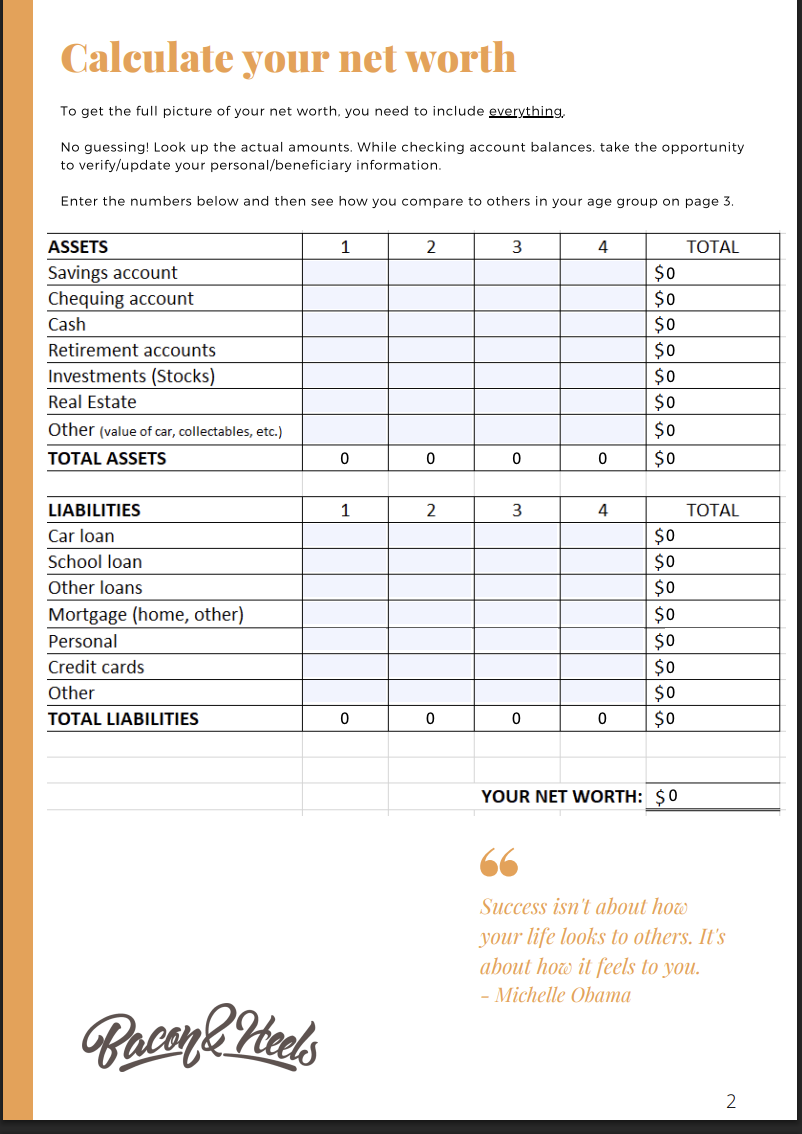Smart Money Moves: Cybersecurity Isn’t the Only Thing You Should Be Securing
%2520(1200%2520x%2520630%2520px)%2520(17).png)
%2520(1200%2520x%2520630%2520px)%2520(17).png)
"We talk about threat vectors and zero trust all day. But when’s the last time you patched your financial plan?"
That was the vibe at our recent webinar, Smart Money Moves, featuring Cybersecurity Marketing Society member and certified financial educator Beverly Wilkes. Beverly wears both hats: she’s a marketer at Bell and also a pro at making personal finance less scary.
The truth? Cybersecurity careers are volatile. Layoffs, mergers and acquistions, burnout, pivots. You need financial security to match your job security. Here's your recap of the session every cybersecurity marketer should watch.
Know Where You Stand, Start with Net Worth
Most of us avoid this part.
We don’t want to look at the credit card balances, admit how much we owe on that car loan, or realize our savings account hasn’t moved in a year.
But Beverly Wilkes says that’s exactly where you need to start.
Assets - Liabilities = Net Worth
Call it your personal asset inventory. You wouldn’t run a vulnerability scan without a full inventory, so why manage your life that way? List everything. Every account, every debt, every dollar. This isn’t about shame. It’s about finally seeing what’s true, so you can take control of it.
🧾 Want to calculate yours? Use Beverly Wilkes’ net worth tracker (shown below) to list out your assets and liabilities.

Ditch the Budget. Build a Spending Plan.
Budgets feel like punishment. A spreadsheet of shame. A list of things you can’t do, can’t buy, and can’t enjoy.
Beverly Wilkes says: Forget that. You don’t need a budget; you need a spending plan.
Instead of tracking every latte, you split your paycheck into four intentional buckets:
- 20% → Pay Yourself
Savings, retirement, investments, and the future you.
- 50% → Essentials
Rent, groceries, bills, and the boring-but-mandatory.
- 20% → Debt
Student loans, credit cards, and tackle what you owe.
- 10% → Fun
Yes, you are allowed joy. Guilt-free.
Think of it like network segmentation: each dollar has a role, a route, and a reason.
Debt Is a CVE You Haven’t Patched Yet
Debt doesn’t feel like a threat until it’s too late. Then suddenly it’s consuming your paycheck, peace of mind, and options. Beverly compares debt, especially high-interest credit card debt, to a critical vulnerability: silent, creeping, and expensive.
If that’s you right now, here’s how to start patching:
- Snowball method: Pay off the smallest balances first. Build momentum. Stack wins.
- Avalanche method: Pay off the cards with the highest interest rate first. Save more in the long run.
And Bev’s micro-strategy? Always round up. If your minimum payment is $283.17, pay $284. That tiny overage sends a positive signal to credit bureaus, and it matters over time.
Whatever path you take, remember: debt doesn’t define your intelligence, ambition, or future. But ignoring it does.
Investing Is Boring (and That’s the Point)
When most people think of investing, they picture Warren Buffett or Reddit bros YOLO-ing into meme stocks.
Beverly wants to rewire that image completely.
Investing isn’t:
❌ Chasing the next hot stock
❌ Just for people with six figures
❌ Only about ETFs, crypto, or real estate
It’s about consistency over time, like compounding trust in a nurture campaign.
Bev’s five-step starter kit is refreshingly simple:
- Pick your timeline: Are you investing for 5 years? 20? Retirement?
- Decide on your number: $50 a month? $500? Pick something sustainable.
- Open an investment account: a Roth IRA, 401(k), TFSA, or RRSP—whatever fits your country and goals.
- Choose your mix: Robo-advisor, index funds, stocks, real estate.
- Track it: But not every day. Once a month is enough.
And the sooner you start, the better. Bev’s Jack/Jill/Joey example showed it loud and clear:
- Jack started investing $200/month at age 25 and stopped at 35.
- Jill waited until 35 but invested until 65.
- Joey started even later, at 45.
Even though Jack only invested for 10 years, he ended up with more than Jill, all thanks to compound interest doing the heavy lifting over time.
📌 The lesson? Start. Now. Even small amounts can snowball if you give them enough runway.
Stock Options Are Not a Retirement Plan
Stock options sound exciting, like you’ve just been handed a golden ticket to future wealth. But Beverly Wilkes wants you to read the fine print.
If you work for a startup, you might receive equity in the form of stock options, which are the right to buy shares in the company at a set strike price.
But here’s the kicker:
- You don’t own them yet. You must wait for them to vest (usually over four years, with a one-year cliff).
- If you leave the company, you might only have 30-90 days to buy them.
- And if the company gets acquired or folds, you might walk away with… nothing.
So yes, stock options can be powerful. But don’t treat them like guaranteed money.
Bev’s take: “It’s not your retirement plan. It’s a maybe and should only be one part of your strategy.”
Think of it like conversion rates: that top-of-funnel number might look huge, but not everything will land.
Retirement Is a Security Layer, Too
Retirement can feel abstract, like something future-you will figure out “someday.”
But Beverly Wilkes urges you to think differently. Because in a volatile industry like cybersecurity, your career might not follow a straight 30-year path.
Here’s Bev’s simple rule of thumb:
💡 70% of your current income × 25 = your retirement savings target
It’s not an exact science, but it gives you something real to plan toward.
And here’s how you start building that number:
- Traditional IRA: tax-deferred savings for the long term
- Roth IRA: taxed now, grows tax-free later
- 401(k): higher contribution limits, plus employer matching if you’re lucky
📍 Bonus tip: If your company offers matching, that’s free money. Don’t leave it on the table.
Beverly also made it clear: this matters even more for women. Why? We tend to live longer. We often earn less. And we’re more likely to take time out of the workforce.
So yes, retirement planning is for everyone. But for women especially, your money needs to work smarter and longer.
Talking About Money Is the Real Power Move
You know what people talk about more comfortably than money? Politics. Sex. Office drama. Even burnout.
But salary? Savings? Debt? Investments? Those still feel taboo, especially in industries where everyone’s pretending to have it figured out.
Beverly Wilkes called this out head-on during the webinar: “You can't grow financially if you’re too afraid to discuss it.”
The truth is: financial literacy thrives in community. So start the conversations—in your DMs, mentorship calls, and Slack threads. Normalize questions. Compare salaries. Share resources.
Because the most powerful thing you can do with your money isn't save it or invest it; it’s talk about it. Money conversations are professional development, and the more we have them, the stronger and more secure this industry will become.
✅ Watch. Revisit. Share.
If this post made you open your banking app, question your retirement plan, or feel a little less alone, mission accomplished.
💻 Watch the full webinar replay with Beverly Wilkes.
📥 Download a net worth tracker. Start your spending plan. Text a friend about what they’re investing in. Ask a mentor what they wish they’d done in their 30s.
🔐 You secure products. You defend brands. Now secure your future.

.png)
.png)
.png)